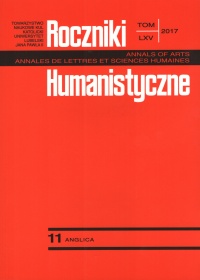Modernity and Utopia in Bruno Latour’s We Have Never Been Modern and Gabriel Josipovici’s What Ever Happened to Modernism
Abstract
This article seeks to explore the relation between utopia and modernity on the basis of Thomas More’s Utopia (1516) as well as two seminal contemporary studies: Bruno Latour’s We Have Never Been Modern (1992) and Gabriel Josipovici’s What Ever Happened to Modernism? (2010). The ambiguous nature of the modern prototype of utopia which displays both the eutopian and the dystopian (self-critical) impulse seems reflected in the nature of modernity. With auto-criticism inscribed in the constitution of both utopia and modernity, the leading desires of the modern period—for a greater emancipation and domination—prove to be its greatest burden both in the socio-political sphere as well as in art and literature.
References
Baldick, Chris. The Concise Oxford Dictionary of Literary Terms. Oxford University Press, 1990.
Bloch, Ernst. The Principle of Hope. Translated by Neville Plaice, Stephen Plaice and Paul Knight. MIT Press, 1996.
Bronner, Stephen Eric. Modernism at the Barricades: Aesthetics, Politics, Utopia. Columbia University Press, 2012.
Chen-Morris, Raz, Hanan Yoran, and Gur Zak. “Renaissance Humanism and the Ambiguities of Modernity: Introduction.” The European Legacy: Toward New Paradigms 20.5 (2015), pp. 427–434.
Goodwin, Barbara and Keith Taylor. The Politics of Utopia: A Study in Theory and Practice. Peter Lang, 2009.
Gordin, Michael, Helen Tilley and Gyan Prakash. Eds. Utopia/Dystopia: Condition of Historical Possibility. Princeton University Press, 2010.
Greenblatt, Stephen. Renaissance Self-Fashioning: From More to Shakespeare. University of Chicago Press, 1980.
Gregory, Rosalyn and Benjamin Kohlmann. Eds. Utopian Spaces of Modernism. Palgrave Macmillan, 2012.
Howe, Irvin. A Margin of Hope: An Intellectual Autobiography. Harcourt Brace Jovanovich, 1982. Qtd. in Rosalyn Gregory and Benjamin Kohlmann. Eds. Utopian Spaces of Modernism. Palgrave Macmillan, 2012.
Jameson, Fredric. Archeologies of the Future. Verso, 2005.
Josipovici, Gabriel. What Ever Happened to Modernism? Yale Univeristy Press, 2010.
Kierkegaard, Søren. The Concept of Anxiety. Edited and translated by Reidar Thomte and Albert B. Anderson. Princeton University Press, 1980.
Kumar, Krishan. “Utopia’s Shadow.” In Dystopia(n) Matters: On the Page, on Screen, on Stage. Edited by Fatima Vieira. Cambridge Scholars Publishing, 2013, pp. 19–22.
Latour, Bruno. We Have Never Been Modern. Harvard University Press, 1993.
Levitas, Ruth. The Concept of Utopia. Peter Lang, 1990.
More, Thomas. Utopia. Icon Classics, 2005.
Reeve-Tucker, Alice and Nathan Waddell. Eds. Utopianism, Modernism and Literature in the 20th Century. Palgrave Macmillan, 2013.
Ribeiro Romano, Ana Cláudia. “Utopia, Dystopia and the Satire: Ambiguity and Paradox.” In Dystopia(n) Matters: On the Page, on Screen, on Stage, edited by Fatima Vieira. Cambridge Scholars Publishing, 2013, pp. 64–68.
Sargent, Lyman Tower. “Do Dystopia’s Matter?”. In Dystopia(n) Matters: On the Page, on Screen, on Stage, edited by Fatima Vieira. Cambridge Scholars Publishing, 2013, pp. 10–13.
Skinner, Quentin. “Thomas More's Utopia and the language of Renaissance humanism.” In The Languages of Political Theory in Early-Modern Europe. Edited by Anthony Pagden. Cambridge University Press, 1987, pp. 123–157.
Stillman, Peter G. “Dystopian Critiques, Utopian Possibilities, and Human Purposes in Octavia Butler's Parables.” Utopian Studies 14.1 (2003), pp. 15–35.
Todorov, Tzvetan. Imperfect Garden: The Legacy of Humanism. Princeton University Press, 2002.
Vieira, Fatima. “The Concept of Utopia. ” In The Cambridge Companion to Utopian Literature. Edited by Gregory Claeys. Cambridge University Press, 2010, pp. 3–27.
Yoran, Hanan. Between Utopia and Dystopia: Erasmus, Thomas More and Humanist Rapublic of Letters. Lexington Books, 2010.
Zima, Peter V. Modern/Postmodern: Society, Philosophy, Literature. continuum, 2010.
Copyright (c) 2017 Roczniki Humanistyczne

This work is licensed under a Creative Commons Attribution-NonCommercial-NoDerivatives 4.0 International License.





